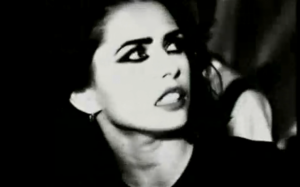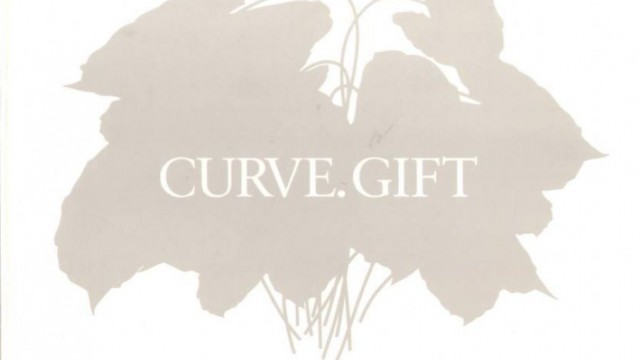
Toni Halliday, lead vocalist of Curve
Curve, the rock duo of Toni Halliday and Dean Garcia, never got the honor it deserved.
While they were active long before Garbage, that band got the international spotlight. Now, I love Garbage. I won’t be doing a series on them if I felt otherwise, but their success lay in their ability to craft hooky, pop-coated tunes. There is absolutely nothing wrong with that, but it was unfortunate that band got the majority of attention, while Curve’s reputation never really extended beyond the United Kingdom (they have a bit of a cult following in the States; Gregg Araki is a big fan, as evidenced by his films’ soundtracks). This doubly a shame, considering their album, Gift, is one of the best, most underrated albums of the aughts.
Curve fused alt-rock and electronica, but they were less concerned in finding the radio-friendly monster hits and more using it as a both a teasing mystery posing as a naked reveal. Listening to the album, it’s a bit like reading a well-written, introspective, but ultimately nameless diary: all the depth is there, but one is never certain who the author is. The album goes deep but it fades off, leaving the listener stranded in a new, unfamiliar environment. The opening track, ‘Hell Above Water,’ is a thundering, crunchy rock song, best know for featuring in the trailer for Spiderman (2002). It was unsurprisingly the lead single; the most radio friendly tune on the album. Catchy, stylish, buzzing with fiery guitar riffs.
The next song, the similarly catchy ‘Gift’ teasingly mocks the pop-centric nature of the first single: ‘It’s the gift that you’re given/And I’m the one to show it to you babe/The one to show it too you babe/Do it to please me.’ Curve had faced a few stressful years battling with their label over the release of this album, and it’s hard not to take this song as a subtle way of asserting they are in control of their musical output, not the label.
The album’s third track, the joyously upbeat ‘moving on’ song ‘Want More Need Less,’ is where the weirdness really begins to show. Instead of playing the tune as a ‘fuck you, haters!’ anthem or a pollyanna ‘can’t we all get along’ ballad. It’s more a nonchalant shrug and a choice to choose happiness over bullshit, all delivered as if Chrissie Hynde and My Bloody Valentine collaborated on a single. Halliday sings ‘I want fun and feeling/Let them get on, get on, get on, get on/I want good and gracious/Let them get on, get on, get on, get on, ‘ and you know she means business. However, she has no time for threats or pleas. She’s moving on, and you can either join her or stay behind.
This is the tipping point for the album: the electronica become more pronounced, and the songs take on a more acutely introspective edge. ‘Want More, Need Less,’ ‘Perish,’ and ‘Hung Up’ play almost as a triptych for a failed relationship. ‘Perish’ is the song about the realization the love has died. The imagery of memories and ghosts, along with its sharply melancholic atmosphere (Halliday sings ‘I’m scared’ in the background), are sensitively drawn so it all sounds recognizable, but just off-kilter enough to feel fresh and candid. ‘Hung Up’ continues the icily ethereal electronic production, and the delicate vocals of Halliday whispering ‘give me one chance,’ suggest depths of despair that follow the initial outward confidence of being newly single. Despite it’s superficial familiarity, the rest of the album runs on these deeper, sadder currents.
Throughout Gift, Halliday plays the chilly, almost alien chanteuse. Her quick wit, coupled with simultaneously aloof and inviting vocals, keep the listener on their toes. She is most open when she teases about being open. In ‘Polaroid,’ she lays it bare: ‘Can you see me?/For the shadow that I am/Do you believe me?/When I’m as shallow as I am/I’m waiting patiently/For the Polaroid to take hold/Then all my secrets/They will unfold.’
Gift could all collapse into being an annoying, phony put-on. However, between Garcia’s taut production and Halliday’s shimmery intelligence, it plays like a great Chinese box of an album: pop disguising a confessional bit of electro-pop soul. The album was released in 2001, when many 90s bands and singers where being unceremoniously dumped in favor of the hottest promising acts of the new millennium. Some sought to show their range and try to adapt to the shifting musical trends. Curve opted to fade into obscurity, but the beauty and grace with which they went, as evidenced on Gift, remain elegant and lovely to this day.


